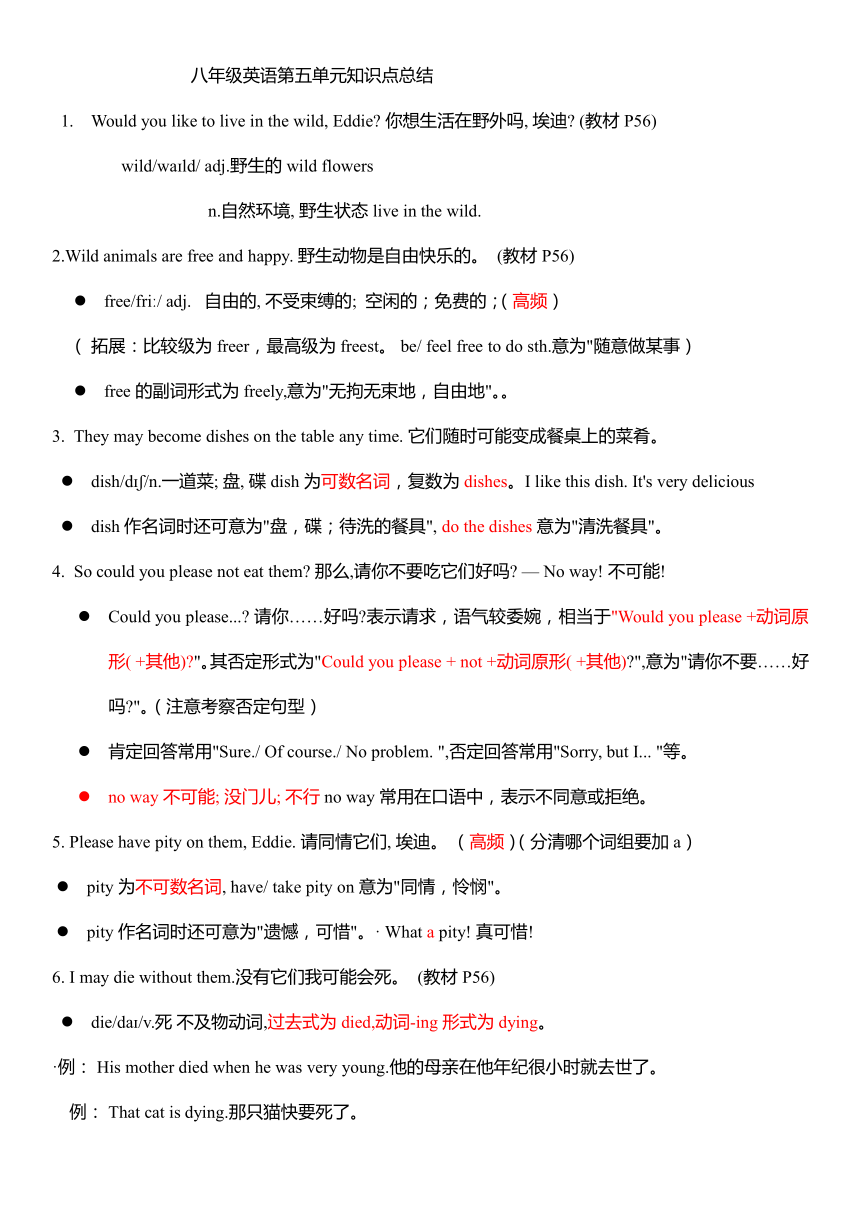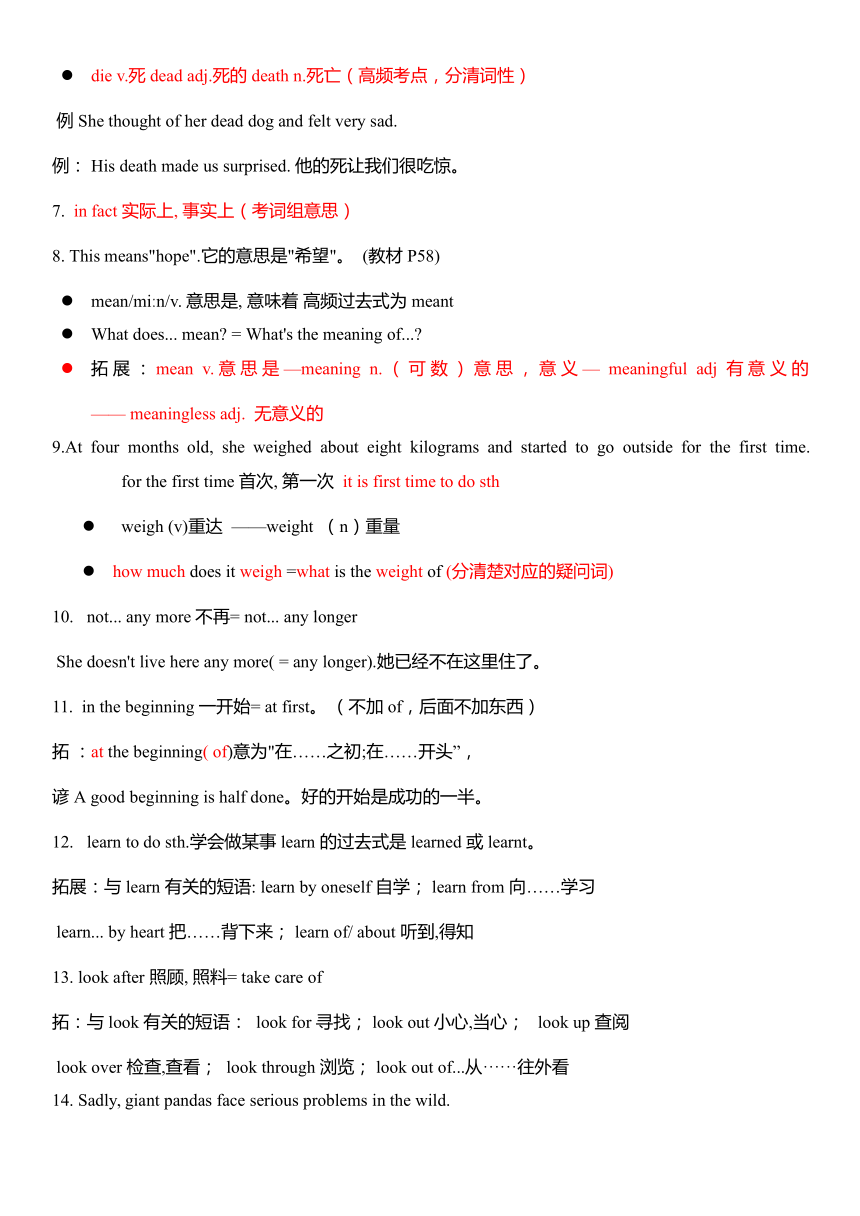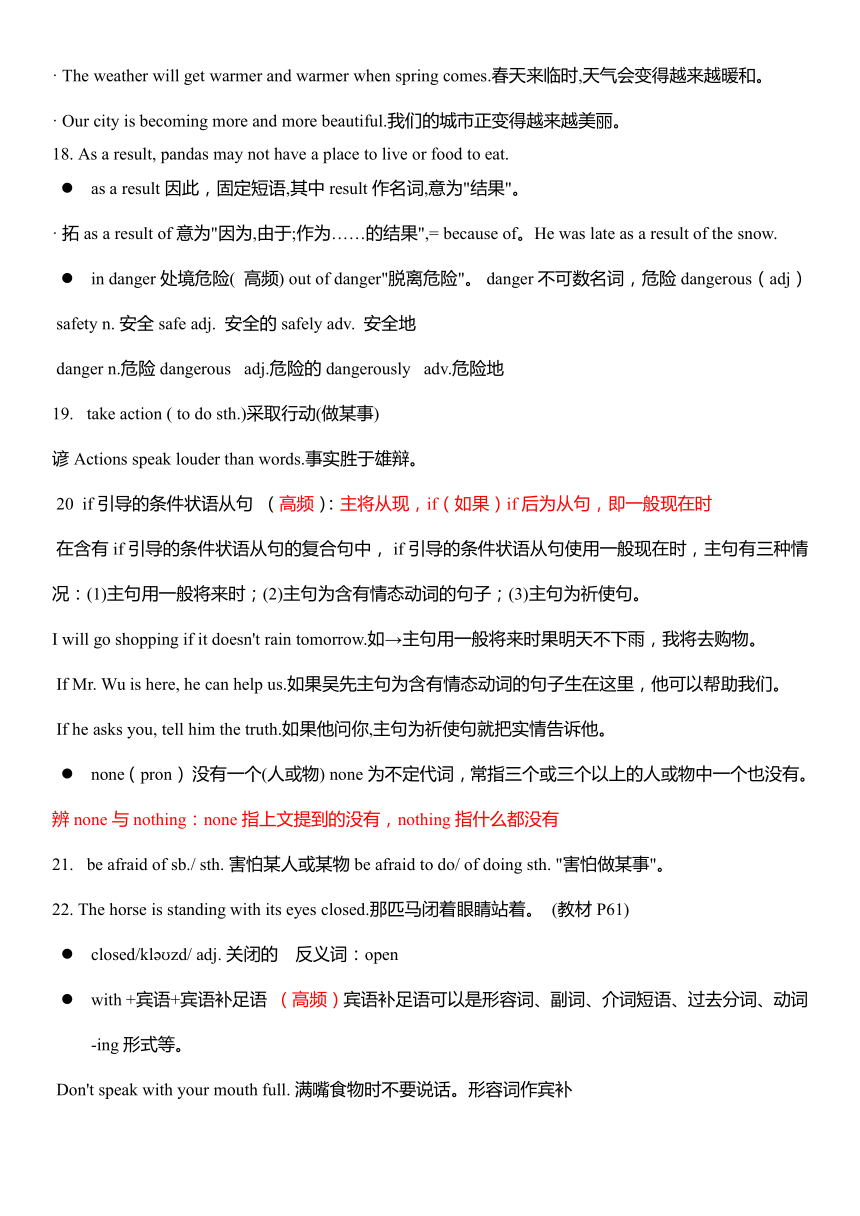Unit 5 Wild animals 单元知识点 牛津译林版八年级上册
文档属性
| 名称 | Unit 5 Wild animals 单元知识点 牛津译林版八年级上册 |

|
|
| 格式 | docx | ||
| 文件大小 | 37.0KB | ||
| 资源类型 | 教案 | ||
| 版本资源 | 牛津译林版 | ||
| 科目 | 英语 | ||
| 更新时间 | 2024-11-17 00:00:00 | ||
图片预览




文档简介
八年级英语第五单元知识点总结
Would you like to live in the wild, Eddie 你想生活在野外吗, 埃迪 (教材P56)
wild/wa ld/ adj.野生的 wild flowers
n.自然环境, 野生状态live in the wild.
2.Wild animals are free and happy. 野生动物是自由快乐的。 (教材P56)
free/fri / adj. 自由的, 不受束缚的; 空闲的;免费的;(高频)
( 拓展:比较级为 freer,最高级为 freest。 be/ feel free to do sth.意为"随意做某事)
free的副词形式为 freely,意为"无拘无束地,自由地"。。
3. They may become dishes on the table any time. 它们随时可能变成餐桌上的菜肴。
dish/d /n.一道菜; 盘, 碟dish 为可数名词,复数为 dishes。I like this dish. It's very delicious
dish 作名词时还可意为"盘,碟;待洗的餐具", do the dishes意为"清洗餐具"。
4. So could you please not eat them 那么,请你不要吃它们好吗 — No way! 不可能!
Could you please... 请你……好吗 表示请求,语气较委婉,相当于"Would you please +动词原形( +其他) "。其否定形式为"Could you please + not +动词原形( +其他) ",意为"请你不要……好吗 "。(注意考察否定句型)
肯定回答常用"Sure./ Of course./ No problem. ",否定回答常用"Sorry, but I... "等。
no way不可能; 没门儿; 不行 no way 常用在口语中,表示不同意或拒绝。
5. Please have pity on them, Eddie. 请同情它们, 埃迪。 (高频)(分清哪个词组要加a)
pity为不可数名词, have/ take pity on 意为"同情,怜悯"。
pity作名词时还可意为"遗憾,可惜"。· What a pity! 真可惜!
6. I may die without them.没有它们我可能会死。 (教材P56)
die/da /v.死 不及物动词,过去式为 died,动词-ing形式为 dying。
·例: His mother died when he was very young.他的母亲在他年纪很小时就去世了。
例: That cat is dying.那只猫快要死了。
die v.死 dead adj.死的 death n.死亡(高频考点,分清词性)
例She thought of her dead dog and felt very sad.
例: His death made us surprised. 他的死让我们很吃惊。
7. in fact 实际上, 事实上(考词组意思)
8. This means"hope".它的意思是"希望"。 (教材P58)
mean/mi n/v. 意思是, 意味着 高频过去式为 meant
What does... mean = What's the meaning of...
拓展:mean v.意思是—meaning n.(可数)意思,意义— meaningful adj有意义的—— meaningless adj. 无意义的
9.At four months old, she weighed about eight kilograms and started to go outside for the first time. for the first time 首次, 第一次 it is first time to do sth
weigh (v)重达 ——weight (n)重量
how much does it weigh =what is the weight of (分清楚对应的疑问词)
10. not... any more不再= not... any longer
She doesn't live here any more( = any longer).她已经不在这里住了。
11. in the beginning 一开始= at first。 (不加of,后面不加东西)
拓 :at the beginning( of)意为"在……之初;在……开头”,
谚 A good beginning is half done。好的开始是成功的一半。
12. learn to do sth.学会做某事learn的过去式是 learned 或 learnt。
拓展:与 learn 有关的短语: learn by oneself 自学; learn from 向……学习
learn... by heart 把……背下来; learn of/ about 听到,得知
13. look after 照顾, 照料= take care of
拓:与 look 有关的短语: look for寻找; look out 小心,当心; look up查阅
look over检查,查看; look through 浏览; look out of...从······往外看
14. Sadly, giant pandas face serious problems in the wild.
sadly/'s dli/ adv.令人遗憾地, 不幸地;伤心地(副词可置于句首作状语,修饰整个句子;也可以放在行为动词之后,起修饰动词的作用。)
拓: She cried sadly. Her sadness made her mother sad. 她伤心地哭了起来。
face/fe s/v.面临; 面对· We are brave enough to face difficulties. 面对困难,我们足够勇敢。
拓 face 可数名词,意为"脸,面孔;面部表情" face to face"面对面"; make faces = make a face"做鬼脸
·serious/'s ri s/ adj.严重的,严肃的,认真的 be serious about…意为"对……认真"。
serious的副词形式为 seriously"严重地;严肃地,认真地",
15. For example, it is very difficult for pandas to have babies...例如, 大熊猫很难孕育幼崽……
It's + adj. + for sb. + to do sth. 高频(It 在该结构中作形式主语,真正的主语是 todo sth.。其中形容词表示事物的特点,如 necessary ( 必 要 的)、 interesting(有 趣 的)、 popular(受欢迎的)、 useful(有用的)等。)
It's + adj. + of sb. + to do sth. "结构中,形容词说明人的品质特征kind(体贴的) polite(礼貌的)、 friendly(友好的)等。
·典例 (云南中考) It's necessary _ masks(口罩) in public places during the COVID-19 period.
A. for us to wear B. for us wearing
C. of us wearing D. of us to wear
16 Also, giant pandas live mainly on a special kind of bamboo.
mainly/'me nli/ adv. 主要地; 大部分 mainly 是副词,形容词形式为 main,意为"主要的;最重要的"。
What's the main purpose of your visit 你到访的主要目的是什么
live on 以食……为生; 靠……生活Sheep live mainly on grass.羊主要以食草为生。
17. However, the bamboo forests are becoming smaller and smaller.然而, 竹林正变得越来越小。
however/ha 'ev (r)/ adv.然而 高频
however 后 要用逗号与句子的其他内容隔开but 连词 "但是"其后一般不用 逗号,转折的语气更强
比较级+ and+比较级 (高频)"越来越……当形容词为多音节词或部分双音节词时,用"more and more+形容词原级"。副词也有此用法。
· The weather will get warmer and warmer when spring comes.春天来临时,天气会变得越来越暖和。
· Our city is becoming more and more beautiful.我们的城市正变得越来越美丽。
18. As a result, pandas may not have a place to live or food to eat.
as a result 因此,固定短语,其中 result 作名词,意为"结果"。
· 拓 as a result of 意为"因为,由于;作为……的结果",= because of。He was late as a result of the snow.
in danger 处境危险( 高频) out of danger"脱离危险"。 danger 不可数名词,危险dangerous(adj)
safety n. 安全safe adj. 安全的 safely adv. 安全地
danger n.危险 dangerous adj.危险的 dangerously adv.危险地
19. take action ( to do sth.)采取行动(做某事)
谚 Actions speak louder than words.事实胜于雄辩。
20 if引导的条件状语从句 (高频):主将从现,if(如果)if后为从句,即一般现在时
在含有 if引导的条件状语从句的复合句中, if引导的条件状语从句使用一般现在时,主句有三种情况:(1)主句用一般将来时;(2)主句为含有情态动词的句子;(3)主句为祈使句。
I will go shopping if it doesn't rain tomorrow.如→主句用一般将来时果明天不下雨,我将去购物。
If Mr. Wu is here, he can help us.如果吴先主句为含有情态动词的句子生在这里,他可以帮助我们。
If he asks you, tell him the truth.如果他问你,主句为祈使句就把实情告诉他。
none(pron) 没有一个(人或物) none 为不定代词,常指三个或三个以上的人或物中一个也没有。
辨 none 与 nothing:none指上文提到的没有,nothing指什么都没有
21. be afraid of sb./ sth. 害怕某人或某物be afraid to do/ of doing sth. "害怕做某事"。
22. The horse is standing with its eyes closed.那匹马闭着眼睛站着。 (教材P61)
closed/kl zd/ adj. 关闭的 反义词:open
with +宾语+宾语补足语 (高频)宾语补足语可以是形容词、副词、介词短语、过去分词、动词-ing形式等。
Don't speak with your mouth full. 满嘴食物时不要说话。形容词作宾补
He stood before his teacher with his head down.他低着头站在老师面前。副词作宾补
She said goodbye with tears in her eyes. 她含着眼泪告别。 介词短语作宾补
· He fell asleep with the lamp burning. 灯还亮着,他就睡着了。动词-ing作宾补
23 work out 计算; 解决 work it(代词)out(代词放中间)
24. with the help of 在……的帮助下 (高频)= with one's help,意为"在某人的帮助下"。
·25. get lost 迷路= be lost/ lose one's way
26. ( 高频)remember to do sth. 记得去做某事(事情未做)
remember doing sth. 记得做过某事(事情已做)
27. the same... as与……同样(定冠词 the不可缺少) as 后可接名词、代词、从句等。
· She was born on the same day as me.她和我同一天出生。
· Robots can do many of the same things as we humans do, like driving cars.
反义短语为 be different from"与……不同"。 His dream is the same as mine.他的梦想和我的一样。
28 save/se v/ v. 储存, 节省 save 作及物动词,还有"救,救助;保存"之意。
save money存钱save water节约用水save a child救小孩
29情态动词 may的用法:may 是情态动词,可以用来表示可能性,也可以表示许可、准许等。作为情态动词,在句中不可单独作谓语,后要接动词原形,它没有人称和数的变化。
may表示推测
may 通常用于肯定句和否定句中,意为"也许,可能", might 是 may 的过去式,表示推测时,可能性比 may更小。 He may be very busy now. 他现在可能很忙。 He may know you. 他也许认识你。
may与 can 表示可能性的区别
can 和 may 都可表示可能性, can 通常用于否定句和疑问句,而may 则通常用于肯定句和否定句。虽然两者均可用于否定句,但意思不同: can't意为"不可能", may not 意为"可能不"。
It can't be true. 那不可能是真的。 It may not be true. 那可能不是真的。
may表示许可、准许等,此时与 can 同义,可以互换。
许可对方时,其答语可以用"Yes, you may. ",但用"Yes, please./ Certainly./ Of course. "等显得更加礼貌、客气。拒绝对方时,其答语可用"No, you mustn't./ No, you can't. "等。
30.动词不定式作宾语
动词不定式是一种非谓语形式,其基本结构是"to+动词原形",其否定形式是"not to +动词原形"。常见的接不定式作宾语的动词:想要学习 早打算( want learn plan)快准备 有希望( prepare hope wish expect)同意否 供选择( agree offer choose)决定了 已答应( decide promise)
尽力去 设法做( try manage)别拒绝 别假装( refuse pretend)失败不是属于你( fail)
it作形式宾语, 动词不定式作真正的宾语(高频,重要)
31. losing living areas 失去生存区域living/'l v /n. 生存, 生计 make a living "谋生"。
32. I'm sorry to hear that.听到这件事我很难过。 (高频)
该句是人们听到某人(或物)遭遇不幸的事情时,为了表示难过或遗憾而常说的一句话。
也可以说:It's a great pity! 太遗憾了! ②What a shame! 多遗憾啊!
33.后缀-ing、-ness 和-ion
我们可以给一些动词和形容词加-ing、-ness和-ion 来构成名词。
shop → shopping happy → happiness decide → decision invite → invitation
discuss _ celebrate _ collect _ begin kind _
dark sick meet feel invite
sad难过的— sadness悲伤happy 幸福的— happiness 幸福
kind 友好的— kindness 善良sick 生病的— sickness 疾病
34. because of因为, 由于 高频
辨 because of 与 because
because of 短语介词 其后可接名词、代词或动 词-ing作宾语
because 连词 后面要接表示原因的从句。
35. accept/ k' sept/v. 接受, 收受,反义词是 refuse"拒绝"。
辨 accept 与 receive
accept "接受",指主观上愿意接受。指经过考 虑,主动或自愿地接受。
receive "收到",强调客观上收到,但主观上不一 定愿意接受。串记
36. A report on bears 一份关于熊的报告 (教材 P66)
report/r 'p t/n.报告report可与介词 on、 of搭配,意为"关于……的报告"。常用短语为 make a report"作报告"。
report还可以作动词,意为"汇报,报告;报道"。常用句型: It is reported that... "据报道……"。
38. move around slowly in the daytime...白天慢慢地四处活动……
move/mu v/v.活动, 移动, 搬迁 move around 意为"四处活动"。
slowly/'sl li/ adv.缓慢地,比较级为 more slowly,最高级为 most slowly,形容词形式是 slow"慢的"。
39. otherwise/' wa z/ adv.要不然, 否则
词汇梳理
1 free ( adj. 自由的,不受束缚的)— freely ( adv. 无拘无束地,自由地)— freedom (n.自由)
2 die (v. 死)— dead ( adj. 死的)— death (n. 死亡)
3m ean (v. 意思是,意味着)— meaning (n.意思,意义)— meaningful ( adj. 有意义的)— meaningless ( adj. 无意义的)
4 begin (v. 开始)— beginning(n. 开始,开端)
5 sad ( adj. 难过的;令人难过的)— sadly( adv. 不幸地;伤心地)— sadness (n. 悲伤)
6 serious ( adj. 严重的)— seriously ( adv. 严重地)
7 main ( adj. 主要的;最重要的)— mainly( adv. 主要地;大部分)
8 act (v. 行动,表演)— action( n. 行动,行为)— actor(n.男演员)
9 danger ( n. 危险)— dangerous ( adj. 危险的)— dangerously( adv.危险地)
10 lost( adj. 迷路的,迷失的)— lose (v. 失去, 被……夺去;输掉;丢失)
11 ill( adj. 生病的)— illness (n. 疾病)
12 slow( adj. 慢的)— slowly( adv. 缓慢地)
13 hunt (v.猎取)— hunter(n.猎人)
词块归纳
1 in the wild 在野外;处于野生状态
2 have/ take pity on 同情,怜悯
3 for example 例如
4 no way 不可能;没门儿;不行
5 be born 出生,出世
6 in fact 实际上,事实上
7 lose one's life 失去生命
8 in danger 处境危险
9 not… any more 不再
10 at four months old 在4 个月大时
11 in the beginning 一开始
12 look after 照顾,照料
13 live on 以食……为生;靠……生活
14 as a result 因此
15 take action 采取行动
16 right away 立刻,马上
17 smaller and smaller 越来越小
18 at birth 出生时,诞生时
19 work out 计算;解决
20 with the help of 在……的帮助下
21 get lost 迷路
22 the same... as 与……同样
23 for a short while 一小会儿
24 living areas 生存区域
25 because of 因为,由于
26 wild animals 野生动物
27 go out for the first time 第一次外出
28 build more panda reserves 建立更多大熊猫保护区
29 smell things far away 闻到远处的东西
Would you like to live in the wild, Eddie 你想生活在野外吗, 埃迪 (教材P56)
wild/wa ld/ adj.野生的 wild flowers
n.自然环境, 野生状态live in the wild.
2.Wild animals are free and happy. 野生动物是自由快乐的。 (教材P56)
free/fri / adj. 自由的, 不受束缚的; 空闲的;免费的;(高频)
( 拓展:比较级为 freer,最高级为 freest。 be/ feel free to do sth.意为"随意做某事)
free的副词形式为 freely,意为"无拘无束地,自由地"。。
3. They may become dishes on the table any time. 它们随时可能变成餐桌上的菜肴。
dish/d /n.一道菜; 盘, 碟dish 为可数名词,复数为 dishes。I like this dish. It's very delicious
dish 作名词时还可意为"盘,碟;待洗的餐具", do the dishes意为"清洗餐具"。
4. So could you please not eat them 那么,请你不要吃它们好吗 — No way! 不可能!
Could you please... 请你……好吗 表示请求,语气较委婉,相当于"Would you please +动词原形( +其他) "。其否定形式为"Could you please + not +动词原形( +其他) ",意为"请你不要……好吗 "。(注意考察否定句型)
肯定回答常用"Sure./ Of course./ No problem. ",否定回答常用"Sorry, but I... "等。
no way不可能; 没门儿; 不行 no way 常用在口语中,表示不同意或拒绝。
5. Please have pity on them, Eddie. 请同情它们, 埃迪。 (高频)(分清哪个词组要加a)
pity为不可数名词, have/ take pity on 意为"同情,怜悯"。
pity作名词时还可意为"遗憾,可惜"。· What a pity! 真可惜!
6. I may die without them.没有它们我可能会死。 (教材P56)
die/da /v.死 不及物动词,过去式为 died,动词-ing形式为 dying。
·例: His mother died when he was very young.他的母亲在他年纪很小时就去世了。
例: That cat is dying.那只猫快要死了。
die v.死 dead adj.死的 death n.死亡(高频考点,分清词性)
例She thought of her dead dog and felt very sad.
例: His death made us surprised. 他的死让我们很吃惊。
7. in fact 实际上, 事实上(考词组意思)
8. This means"hope".它的意思是"希望"。 (教材P58)
mean/mi n/v. 意思是, 意味着 高频过去式为 meant
What does... mean = What's the meaning of...
拓展:mean v.意思是—meaning n.(可数)意思,意义— meaningful adj有意义的—— meaningless adj. 无意义的
9.At four months old, she weighed about eight kilograms and started to go outside for the first time. for the first time 首次, 第一次 it is first time to do sth
weigh (v)重达 ——weight (n)重量
how much does it weigh =what is the weight of (分清楚对应的疑问词)
10. not... any more不再= not... any longer
She doesn't live here any more( = any longer).她已经不在这里住了。
11. in the beginning 一开始= at first。 (不加of,后面不加东西)
拓 :at the beginning( of)意为"在……之初;在……开头”,
谚 A good beginning is half done。好的开始是成功的一半。
12. learn to do sth.学会做某事learn的过去式是 learned 或 learnt。
拓展:与 learn 有关的短语: learn by oneself 自学; learn from 向……学习
learn... by heart 把……背下来; learn of/ about 听到,得知
13. look after 照顾, 照料= take care of
拓:与 look 有关的短语: look for寻找; look out 小心,当心; look up查阅
look over检查,查看; look through 浏览; look out of...从······往外看
14. Sadly, giant pandas face serious problems in the wild.
sadly/'s dli/ adv.令人遗憾地, 不幸地;伤心地(副词可置于句首作状语,修饰整个句子;也可以放在行为动词之后,起修饰动词的作用。)
拓: She cried sadly. Her sadness made her mother sad. 她伤心地哭了起来。
face/fe s/v.面临; 面对· We are brave enough to face difficulties. 面对困难,我们足够勇敢。
拓 face 可数名词,意为"脸,面孔;面部表情" face to face"面对面"; make faces = make a face"做鬼脸
·serious/'s ri s/ adj.严重的,严肃的,认真的 be serious about…意为"对……认真"。
serious的副词形式为 seriously"严重地;严肃地,认真地",
15. For example, it is very difficult for pandas to have babies...例如, 大熊猫很难孕育幼崽……
It's + adj. + for sb. + to do sth. 高频(It 在该结构中作形式主语,真正的主语是 todo sth.。其中形容词表示事物的特点,如 necessary ( 必 要 的)、 interesting(有 趣 的)、 popular(受欢迎的)、 useful(有用的)等。)
It's + adj. + of sb. + to do sth. "结构中,形容词说明人的品质特征kind(体贴的) polite(礼貌的)、 friendly(友好的)等。
·典例 (云南中考) It's necessary _ masks(口罩) in public places during the COVID-19 period.
A. for us to wear B. for us wearing
C. of us wearing D. of us to wear
16 Also, giant pandas live mainly on a special kind of bamboo.
mainly/'me nli/ adv. 主要地; 大部分 mainly 是副词,形容词形式为 main,意为"主要的;最重要的"。
What's the main purpose of your visit 你到访的主要目的是什么
live on 以食……为生; 靠……生活Sheep live mainly on grass.羊主要以食草为生。
17. However, the bamboo forests are becoming smaller and smaller.然而, 竹林正变得越来越小。
however/ha 'ev (r)/ adv.然而 高频
however 后 要用逗号与句子的其他内容隔开but 连词 "但是"其后一般不用 逗号,转折的语气更强
比较级+ and+比较级 (高频)"越来越……当形容词为多音节词或部分双音节词时,用"more and more+形容词原级"。副词也有此用法。
· The weather will get warmer and warmer when spring comes.春天来临时,天气会变得越来越暖和。
· Our city is becoming more and more beautiful.我们的城市正变得越来越美丽。
18. As a result, pandas may not have a place to live or food to eat.
as a result 因此,固定短语,其中 result 作名词,意为"结果"。
· 拓 as a result of 意为"因为,由于;作为……的结果",= because of。He was late as a result of the snow.
in danger 处境危险( 高频) out of danger"脱离危险"。 danger 不可数名词,危险dangerous(adj)
safety n. 安全safe adj. 安全的 safely adv. 安全地
danger n.危险 dangerous adj.危险的 dangerously adv.危险地
19. take action ( to do sth.)采取行动(做某事)
谚 Actions speak louder than words.事实胜于雄辩。
20 if引导的条件状语从句 (高频):主将从现,if(如果)if后为从句,即一般现在时
在含有 if引导的条件状语从句的复合句中, if引导的条件状语从句使用一般现在时,主句有三种情况:(1)主句用一般将来时;(2)主句为含有情态动词的句子;(3)主句为祈使句。
I will go shopping if it doesn't rain tomorrow.如→主句用一般将来时果明天不下雨,我将去购物。
If Mr. Wu is here, he can help us.如果吴先主句为含有情态动词的句子生在这里,他可以帮助我们。
If he asks you, tell him the truth.如果他问你,主句为祈使句就把实情告诉他。
none(pron) 没有一个(人或物) none 为不定代词,常指三个或三个以上的人或物中一个也没有。
辨 none 与 nothing:none指上文提到的没有,nothing指什么都没有
21. be afraid of sb./ sth. 害怕某人或某物be afraid to do/ of doing sth. "害怕做某事"。
22. The horse is standing with its eyes closed.那匹马闭着眼睛站着。 (教材P61)
closed/kl zd/ adj. 关闭的 反义词:open
with +宾语+宾语补足语 (高频)宾语补足语可以是形容词、副词、介词短语、过去分词、动词-ing形式等。
Don't speak with your mouth full. 满嘴食物时不要说话。形容词作宾补
He stood before his teacher with his head down.他低着头站在老师面前。副词作宾补
She said goodbye with tears in her eyes. 她含着眼泪告别。 介词短语作宾补
· He fell asleep with the lamp burning. 灯还亮着,他就睡着了。动词-ing作宾补
23 work out 计算; 解决 work it(代词)out(代词放中间)
24. with the help of 在……的帮助下 (高频)= with one's help,意为"在某人的帮助下"。
·25. get lost 迷路= be lost/ lose one's way
26. ( 高频)remember to do sth. 记得去做某事(事情未做)
remember doing sth. 记得做过某事(事情已做)
27. the same... as与……同样(定冠词 the不可缺少) as 后可接名词、代词、从句等。
· She was born on the same day as me.她和我同一天出生。
· Robots can do many of the same things as we humans do, like driving cars.
反义短语为 be different from"与……不同"。 His dream is the same as mine.他的梦想和我的一样。
28 save/se v/ v. 储存, 节省 save 作及物动词,还有"救,救助;保存"之意。
save money存钱save water节约用水save a child救小孩
29情态动词 may的用法:may 是情态动词,可以用来表示可能性,也可以表示许可、准许等。作为情态动词,在句中不可单独作谓语,后要接动词原形,它没有人称和数的变化。
may表示推测
may 通常用于肯定句和否定句中,意为"也许,可能", might 是 may 的过去式,表示推测时,可能性比 may更小。 He may be very busy now. 他现在可能很忙。 He may know you. 他也许认识你。
may与 can 表示可能性的区别
can 和 may 都可表示可能性, can 通常用于否定句和疑问句,而may 则通常用于肯定句和否定句。虽然两者均可用于否定句,但意思不同: can't意为"不可能", may not 意为"可能不"。
It can't be true. 那不可能是真的。 It may not be true. 那可能不是真的。
may表示许可、准许等,此时与 can 同义,可以互换。
许可对方时,其答语可以用"Yes, you may. ",但用"Yes, please./ Certainly./ Of course. "等显得更加礼貌、客气。拒绝对方时,其答语可用"No, you mustn't./ No, you can't. "等。
30.动词不定式作宾语
动词不定式是一种非谓语形式,其基本结构是"to+动词原形",其否定形式是"not to +动词原形"。常见的接不定式作宾语的动词:想要学习 早打算( want learn plan)快准备 有希望( prepare hope wish expect)同意否 供选择( agree offer choose)决定了 已答应( decide promise)
尽力去 设法做( try manage)别拒绝 别假装( refuse pretend)失败不是属于你( fail)
it作形式宾语, 动词不定式作真正的宾语(高频,重要)
31. losing living areas 失去生存区域living/'l v /n. 生存, 生计 make a living "谋生"。
32. I'm sorry to hear that.听到这件事我很难过。 (高频)
该句是人们听到某人(或物)遭遇不幸的事情时,为了表示难过或遗憾而常说的一句话。
也可以说:It's a great pity! 太遗憾了! ②What a shame! 多遗憾啊!
33.后缀-ing、-ness 和-ion
我们可以给一些动词和形容词加-ing、-ness和-ion 来构成名词。
shop → shopping happy → happiness decide → decision invite → invitation
discuss _ celebrate _ collect _ begin kind _
dark sick meet feel invite
sad难过的— sadness悲伤happy 幸福的— happiness 幸福
kind 友好的— kindness 善良sick 生病的— sickness 疾病
34. because of因为, 由于 高频
辨 because of 与 because
because of 短语介词 其后可接名词、代词或动 词-ing作宾语
because 连词 后面要接表示原因的从句。
35. accept/ k' sept/v. 接受, 收受,反义词是 refuse"拒绝"。
辨 accept 与 receive
accept "接受",指主观上愿意接受。指经过考 虑,主动或自愿地接受。
receive "收到",强调客观上收到,但主观上不一 定愿意接受。串记
36. A report on bears 一份关于熊的报告 (教材 P66)
report/r 'p t/n.报告report可与介词 on、 of搭配,意为"关于……的报告"。常用短语为 make a report"作报告"。
report还可以作动词,意为"汇报,报告;报道"。常用句型: It is reported that... "据报道……"。
38. move around slowly in the daytime...白天慢慢地四处活动……
move/mu v/v.活动, 移动, 搬迁 move around 意为"四处活动"。
slowly/'sl li/ adv.缓慢地,比较级为 more slowly,最高级为 most slowly,形容词形式是 slow"慢的"。
39. otherwise/' wa z/ adv.要不然, 否则
词汇梳理
1 free ( adj. 自由的,不受束缚的)— freely ( adv. 无拘无束地,自由地)— freedom (n.自由)
2 die (v. 死)— dead ( adj. 死的)— death (n. 死亡)
3m ean (v. 意思是,意味着)— meaning (n.意思,意义)— meaningful ( adj. 有意义的)— meaningless ( adj. 无意义的)
4 begin (v. 开始)— beginning(n. 开始,开端)
5 sad ( adj. 难过的;令人难过的)— sadly( adv. 不幸地;伤心地)— sadness (n. 悲伤)
6 serious ( adj. 严重的)— seriously ( adv. 严重地)
7 main ( adj. 主要的;最重要的)— mainly( adv. 主要地;大部分)
8 act (v. 行动,表演)— action( n. 行动,行为)— actor(n.男演员)
9 danger ( n. 危险)— dangerous ( adj. 危险的)— dangerously( adv.危险地)
10 lost( adj. 迷路的,迷失的)— lose (v. 失去, 被……夺去;输掉;丢失)
11 ill( adj. 生病的)— illness (n. 疾病)
12 slow( adj. 慢的)— slowly( adv. 缓慢地)
13 hunt (v.猎取)— hunter(n.猎人)
词块归纳
1 in the wild 在野外;处于野生状态
2 have/ take pity on 同情,怜悯
3 for example 例如
4 no way 不可能;没门儿;不行
5 be born 出生,出世
6 in fact 实际上,事实上
7 lose one's life 失去生命
8 in danger 处境危险
9 not… any more 不再
10 at four months old 在4 个月大时
11 in the beginning 一开始
12 look after 照顾,照料
13 live on 以食……为生;靠……生活
14 as a result 因此
15 take action 采取行动
16 right away 立刻,马上
17 smaller and smaller 越来越小
18 at birth 出生时,诞生时
19 work out 计算;解决
20 with the help of 在……的帮助下
21 get lost 迷路
22 the same... as 与……同样
23 for a short while 一小会儿
24 living areas 生存区域
25 because of 因为,由于
26 wild animals 野生动物
27 go out for the first time 第一次外出
28 build more panda reserves 建立更多大熊猫保护区
29 smell things far away 闻到远处的东西
